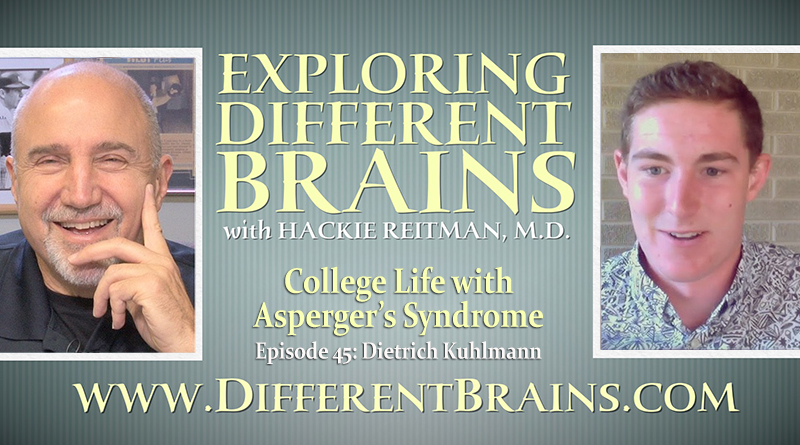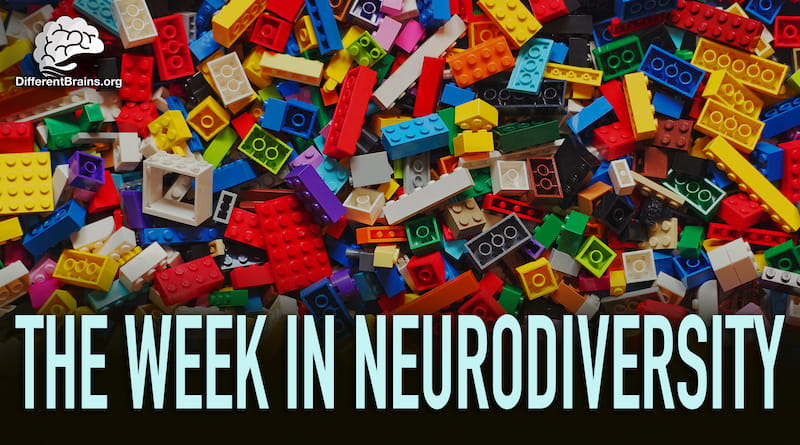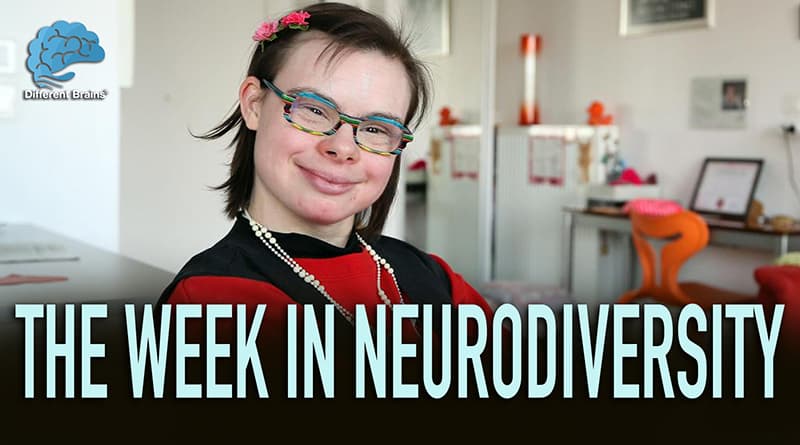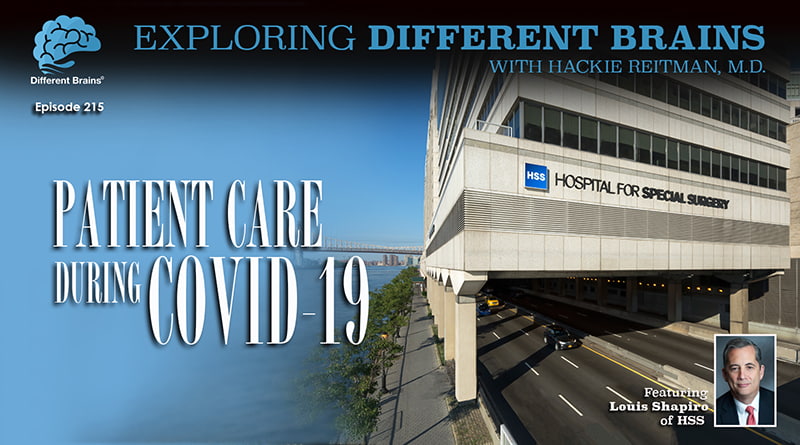
College Life with Asperger’s Syndrome, with Dietrich Kuhlmann | EDB 45
In this episode, Dr. Hackie Reitman speaks with Dietrich Kuhlmann, a sophomore at the University of Miami who also happens to have Asperger’s syndrome. Dietrich talks about how he feels being neurodiverse can offer gifts to individuals, the challenges he has faced with being bullied, and how dedication and family support can help people achieve their goals.
29 Second Preview:
To listen or download the podcast version of this episode, see the embedded player below.
Or look for us on your favorite podcast provider:
iTunes | Stitcher | SoundCloud
[expand title=”View Full Transcript”]
HACKIE REITMAN, M.D. (HR):
Hi, this is Dr. Hackie Reitman. Welcome to another episode of Exploring Different Brains at differentbrains.com. Today, we have the pleasure of speaking with Dietrich Kuhlmann, who is a student at the University of Miami whose got some very unique interests and he’s going to tell us his story. He also happens to have Asperger’s among his other great attributes. Dietrich, welcome!
DIETRICH KUHLMANN (DK):
Thank you!
HR:
So how did you end up at the University of Miami?
DK:
I remember touring the University of San Diego which is where I wanted to go originally and it just didn’t really feel right to me and in a last-second decision to check out Miami and ended up falling in love with it and I’ve been there ever since. So along with that, it was definitely–it has the majors that I wanted to pursue.
HR:
Tell us about the majors you wanted to pursue and how you got interested in that.
DK:
Well honestly, ever since I was a very young child I’ve been extremely fascinated with just nature, the natural world, how ecosystems function, various things of that sort. I always loved being outside and I wanted to attend University of Miami–well of course, when I got to high school I realized that the University of Miami had a really good marine science program. And I remember in 8th grade, I had gone on a brief field trip with my small class–it was only about 50 kids. We went to this place called sea camp in San Diego and that was where I realized that I had a really big passion for the ocean. And just ever since that trip I had wanted to be mainly a marine biologist, but at least something that involved working in the ocean, around the ocean, something that involved marine matters.
HR:
So let me stop you right there because that’s a point I want to make to our viewers that I make in the Aspertools book—that it’s very important to try to harness your hyperinterests, and see if you can figure out a career in that. How you can make a good living, do what you love doing and hopefully help others while you’re doing it. And your interest certainly seems to meet all of those things. You love it, you’ll make a good living at it, and you’ll help save our whole world it sounds like too.
DK:
I hope so. I mean, of course I couldn’t do that alone but my goal certainly is to combat certain issues that are growing today such as climate change, other issues like that. I do want to make some sort of difference, whether that’s in the life of one person, or hundreds, or even thousands.
HR:
You told me you have Asperger’s. How did you figure that out?
DK:
Well, when I was in kindergarten, my teacher noticed some habits of mine. Among those, I was anti I was somewhat antisocial, I was very easily distracted. She just saw all these various sort of symptoms and tell tale signs of Asperger’s, and she told my parents. However, I did not know that I had Asperger’s until I was in the third grade. I remember my mom and I were in the car one day and he just started talking to me about it. And I didn’t really have any idea at that time but it seemed to make sense. By the third grade, I had to work with a Para in class a lot of the time to stay up the pace, up to speed. So when I was in kindergarten, Asperger’s didn’t really affect me profoundly but as I got older, I guess you could say the effects of it started to really take hold.
HR:
Why don’t you tell us some of the things—not to put you on the spot—but some of the things that come to mind. We got somebody in the audience who has Asperger’s, or say who’s a parent whose kid has Asperger’s and they don’t know whether they should tell them and they don’t know what to do. And in case you haven’t noticed, we parents in general are very well-intentioned, but kind of blinded by love and everything’s going to be okay and ignorance and everything else. I don’t say that disparagingly of we parents, because I was certainly the poster child for that. But give us some advice from Dietrich.
DK:
Well I mean, for me, Asperger’s has been both a blessing and a curse. I mean yes, it certainly does have its downsides, but at the same time it has had some profound benefits in my life. It seems that Asperger’s definitely–one of the, I guess, symptoms of it is having these very particular, very sharply focused interests and they stay around for a long time and that’s certainly what happened with me. I’m currently studying marine science and geology. When I was three or four years old, I wanted to be a paleontologist. So that, you know it’s been good for me. It’s allowed me to focus on certain things. And also, I don’t know–I mean it definitely gives me a lot of, I guess, sort of depth of thought in some ways. But really, to your question, I would say don’t be afraid to tell your kid that they have Asperger’s. But also know that they don’t have to feel like it’s this bad thing, because like I said, it does have its downfalls but at the same time it can also boost you in some ways. Though it is not always easy it certainly has some gifts with it.
HR:
You know, the very first chapter in the book Aspertools book is anxiety, which kind of rules all of us.
DK:
Oh, yeah.
HR:
And that if you don’t observe the lead-ups to anxiety, you might end up with a meltdown. And one of the ways to avoid it is to know that you have a safe place to get to. Do you have a safe place on campus there?
DK:
I do actually. There’s a place sort of in the back of campus called the Gifford Arboretum. And basically it’s just–it’s almost like a giant garden with a ton of different tropical plants, various palm trees from all over the world. It seems a little rundown to some people I think, but overall I mean it’s sort of—like I said I’ve always loved nature and that’s definitely the most, I guess. natural feeling place on campus. It’s sort of secluded. Not many people there, and I’m just able to be surrounded by a bunch of really beautiful plants and whatnot. So that definitely acts as a safe place for me.
HR:
Do you ever get meltdowns?
DK:
I haven’t had a really bad one recently. In high school, I would get a couple every year. But still throughout—especially throughout my first semester of college, I had anxiety all the time. And I guess there was maybe one meltdown where I completely answered a question wrong in this biology review thing. And I wasn’t doing too well in that class at the time, and this question that I answered wrong was in front of the entire class, this huge lecture hall. And I have some other issues with anxiety leading up to that, during that day. And I just remember at the end, I definitely think I was crying a bit towards the end of the day, and I my head down and class for the rest of that time. And after that it was only seven o’clock, but I just went straight to bed because I’ve realized sleeping off my anxiety is sometimes the best way to handle it. It just kinda shuts me off from the rest of the world, I can chill out for a bit, relax.
HR:
Tell me from your point of view, your view of different brains or neurodiversity in general.
DK:
Uh, well I mean I can say just from, you know, even getting to know people on campus of the University of Miami, every person is different. I mean personality-wise, of course every person has their own issues in life. I remember my parents telling me, you know, even though I have Asperger’s, I am a normal kid I mean you know everybody has their issues some other kid probably has a serious nut allergy or something like that. So I mean of course that doesn’t have to do with neurodiversity necessarily but what I’m saying is neurodiversity is certainly real. Every person is different in their biological makeup with their brain. And there are a lot of people who definitely struggle with, I guess, those blessings and curses, those mixes with—such as Asperger’s. I remember seeing something from your website about PTSD, OCD, I also have to deal with that and I believe that was part of Asperger’s. But no ADD, I don’t know if epilepsy would have any—
HR:
Yeah, it all does it, all connects. And very few of these, if any, exist in isolation.
Tell me this, do you feel that your senses–any of your senses—are kind of hyper?
DK:
Absolutely, yes. Actually, when I was around ten years old, I did a lot of these summer tennis classes. My brother and I really wanted to get better at tennis. But I remember there was that tennis courts and just the material of its and people would be scraping your shoes on all the time, and I just could not stand it. It was just this nasty, nasty noise to me. I had to wear earplugs all the time but sometimes it’s like—end up trying to like hiss and like make the noise go away. Another issue of mine has–I still don’t like it. There are very few times where I’ve had to write on a chalkboard. But I just really don’t like the feel of it. And also I remember again when I was younger, it was even worse. Just with hearing the sound of it and I don’t know I think sometimes I can associate sounds with these, just, feelings that I can get my hands or somewhere else and it’s just ugh.
HR:
Can you speak to us about your experience, if you’ve had any, with the issue of bullying?
DK:
Throughout my life, I—you know, I’m sure it’s just part of Asperger’s. You know, I’ve never always been a major extrovert. I’ve always sort of–I’ve kept myself sometimes. A lot of times, I preferred to do things on my own instead of interact with people. And you know, sometimes when I was thrown into interactions it would be sort of, again, over stimulating. I wouldn’t be sure what to do, I would be kind of awkward or uncomfortable. And I remember in elementary and middle school, when Asperger’s was becoming very apparent to me and I had a para with me all the time, I remember there were a number of kids who would kinda push me around and bully me. I don’t think all of it was related to Asperger’s but I can definitely see how it was sort of indirect. Like I said, I was just an awkward kid. And therefore, you know, sort of an easy target. So I do remember there was this one boy for about three years who made my life truly miserable in school, and it was absolutely terrible. And time and time again, I would tell my teachers year after year, “hey, he’s really been bothering me, here’s what happens. Can you please just do something about it?” and all the time it would just be that little like, you know, slap on the wrist. Like, “no, don’t do that, that’s bad.” Like that’s all they would do for it, and I remember eventually in sixth grade I told my teachers, “look, this has been going on time and time again.” And I actually remember right before I talk to my teachers, I was talking to my parents. And I had another meltdown just thinking about it. And the next day, I go to my teachers and I just tell them, “look, here’s what’s been happening with this boy. I’ve tried to be nice to him it’s been going on for three years now. I’ve told my teachers time and time again to please make it stop and nothing’s happened.
And eventually, I guess my sixth grade teachers just really sort of cracked the whip with that one, and they talk to him right after I talked, and completely stopped after that. So that was very nice. Yeah, that was the most significant experience with bullying, but beyond that I guess, you know, again it’s just indirect things like—throughout my life, I have been sort of made fun of for being awkward. Or, you know, I remember being sort of, again, not exactly reclusive but I wasn’t always the most talkative into my classes in high school and I wasn’t very relatable to some of the kids. I remember being called a nerd outright, and other stuff. I mean, middle and elementary school’s where bullying was most significant but I mean there’s been times on and off throughout my life where, you know, it’s not that I have Asperger’s. It’s not like somebody knows I have it and they’re saying, “oh, I’m gonna make fun of him for that.” But just with the traits that come with it, it definitely makes me a target. It’s been that way throughout my life.
HR:
Do you have any siblings?
DK:
I do. I have two younger brothers.
HR:
Tell me about them a little bit.
DK:
So, the middle brother is Kalin. He’s about a year-and-a-half younger than me. He is about to be a freshman at the University of Oregon. He’s definitely, uh, I guess he’s sort of acted as a balancing, sort of, force for me. He is a major extrovert. Once he came to my high school I think that’s what helped me come out of my shell a bit. You know, he definitely—I was able—I was comfortable for the most part around him and then, therefore I was able to be comfortable hanging out with him and with all his friends, so a lot more people got to know me. My youngest brother Mason, he is going to be a sophomore in high school and just recently, this past year, we actually found out that he has a lot of the similar lot of similar issues to what I have. Just slower processing speed. I don’t believe he has Asperger’s, but slower processing speed, attention issues, anxiety. Yeah he’s sort of a mix of Kalin and I. Very athletic, Kalin is too. I guess Kalin’s also had a long-held interest, kind of like me, except his interest has been sports throughout his life. And part of the reason he went to Oregon is to study sports management so…
HR:
Cool. So he’s getting his niche as well.
Absolutely, yes.
HR:
Tell me about your parents.
DK:
So my parents are Hans and Robin. They’ve been married for over 20 years. My mom has definitely been a very strong force for me, as has my dad. Always been very supportive of me. Right when we found out that I had Asperger’s—or right when my parents did, because I didn’t know for another three years—they did a lot of research. So I guess to put it simply, my parents, they didn’t necessarily, you know, coddle me for having this sort of issue with neurodiversity—which I’m kind of glad they didn’t because, you know, at the same time they didn’t let me, you know, just like crash and burn all the time. It was just they taught me that hard work pays off and just keep going at what you want. Don’t expect handouts, but just keep working hard and eventually professors will notice that, teachers will notice that. It will pay off for you. And it definitely has so far been a huge impact on my life.
HR:
One of the chapters I have in the Aspertools book is about difficulties with transitions. How have transitions been handled by you?
DK:
Really any transition that I’ve had in school has been very tough. Not necessarily jumping from year to year, but going from elementary to middle school, middle school to high school, high school to college. I mean sixth grade was very rough for me because that’s when middle school starts in Colorado, and I remember I actually had to transfer over to a school called Denver Academy for a couple years—and they focus more on neurodiversity—just because I could not handle my old elementary school/middle school. And so that transition was very intimidating again with high school. It was really, really difficult. I mean blowing out my knee while playing football in Brighton freshman year sort of was not really a good add-on to it. But you know, even aside from that, high school itself was just very tough to get used to. And then college was my toughest transition in my own life. I mean I don’t even find the words. It was just really brutally difficult sometimes.
HR:
What advice would you have for our viewers and listeners and readers who are going to go be going from middle school to high school or from high school to college? We addressed in Aspertools and really stress preparation, preparation, preparation for transitions as at least it’s a positive thing you can do. But what would you add to that?
DK:
I mean I’ve always sort of been a perfectionist, but over time I’ve realized it’s okay to struggle in certain areas. It’s even okay to fail. I mean my first semester of college I was placed in a biology class that had a professor who was notorious for being extremely difficult, and I ended up failing that class and it made me feel really depressed sometimes and very frustrated. But, you know, as my mom said to me one day, “I’d be really proud of you if you have an A in biology. I’m even more proud of you that you’re failing but you’re still keeping your head up and you’re gonna try to power through it,” because I still went into that class every day saying I’m gonna power through this, going to do my best, if it doesn’t work out in this class, that’s how it’s gonna be. I will find some other way to be successful and to be happy in life. And I’d say to anybody who faces neurodiversity, again, you have blessings and curses with that. There’s a mix.
But if you’re dealing with some transition, system such as elementary to middle school or middle school to high school, know that it’s probably not going to be perfect. Know that you might have some rough days and it can be very difficult sometimes but just try to keep your head up. I mean you’re gonna face some new challenges that you haven’t faced before and it’s going to be very intimidating and you might have this feeling that you’re not going to be able to make it through this. But believe me, from experience, I can promise you that if you just have an open mind and you face these struggles, just know that you will eventually come out on top whether that’s within a week, within a year, within a few years. I mean trust me. Life does get better over time and it doesn’t necessarily get easier. But I’m a very happy person right now, and I’ve had some very massive struggles. So just know that you will be okay in the end.
HR:
It’s been great to talk to you. We’ve been talking here today with the University of Miami student Dietrich Kuhlman, who’s from Colorado and he’s really, really, laid out some great stuff here for all of us to learn from. Dietrich, thank you very much for being with us here on Exploring Different Brains. Thanks!
DK:
Thank you so much for the opportunity, it’s truly an honor.
[/expand]
This video is owned by Different Brains Inc, kindly donated by it’s original producer PCE Media LLC.
Different Brains® Inc. founder Harold “Hackie” Reitman, M.D. is an author, filmmaker, retired orthopedic surgeon, former professional heavyweight boxer, the past chairman and president (and current board member) of The Boys and Girls Clubs of Broward County, and a neurodiversity advocate. However, it was his role as a father that led to the creation of the DifferentBrains.org website.
Hackie’s daughter Rebecca grew up with epilepsy, 23 vascular brains tumors, and underwent 2 brain surgeries before the age of 5. Her struggles and recovery put him on the road to, through 26 professional heavyweight boxing matches, raising money for children’s charities (to which he donated every fight purse).
Rebecca eventually went on to graduate from Georgia Tech with a degree in Discrete Mathematics, and Dr. Reitman wrote and produced a film based on her experiences there (The Square Root of 2, starring Darby Stanchfield of ABC’s Scandal). After graduation, Rebecca received a diagnosis of Asperger’s syndrome. Hackie, shocked at his own ignorance of the topic despite being an M.D., embarked on years of research that culminated with his book Aspertools: The Practical Guide for Understanding and Embracing Asperger’s, Autism Spectrum Disorders, and Neurodiversity (released by HCI books, publishers of the Chicken Soup for the Soul series).
This experience revealed to Hackie the interconnectedness of the conditions that fall under the neurodiversity umbrella, while alerting him to the in-fighting and fractured relations that often plague the organizations tasked with serving the community. Convinced that overcoming these schisms could help all of society, Hackie forged the Different Brains philosophy of inclusive advocacy: “Supporting Neurodiversity – From Autism to Alzheimer’s and All Brains In Between”.
In the company’s initial years of operation, Hackie self-financed all of the content on DifferentBrains.org, all of which offered free to view to the public. Currently he is the host of our weekly interview show Exploring Different Brains, writes blogs for the site, and tours the country speaking at conferences, conventions and private functions, all with the goal of improving the lives of neurodiverse individuals and their families, and maximizing the potential of those with different brains. Separate from Different Brains, Hackie is the founder and CEO of PCE Media, a media production company focusing on reality based content. He recently co-executive produced the documentary “Foreman”, the definitive feature documentary on legendary boxer and pitchman George Foreman.




